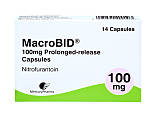Nitrofurantoin / MacroBID
Order Consultation for Urinary Tract Infection Treatment


Nitrofurantoin is an antibiotic which fights bacteria. It is mainly used to treat urinary tract infections – for example in medicinal products like MacroBID. To place a prescription order for urinary tract infection treatment, fill in our brief questionnaire. There, you can choose a preferred treatment, such as nitrofurantoin.
One of our doctors will check if the medication is suitable for you and issue your prescription to a local pharmacy in Ireland. Alternatively you can get the medication delivered directly to your home address. A consultation for urinary tract infection treatment prescription costs €21.50.



About Nitrofurantoin
-
-
Nitrofurantoin is an antibiotic frequently used to treat cystitis, which is more common in women. A course of nitrofurantoin usually involves taking 1 capsule twice a day for 3 days – you should notice a significant improvement to your symptoms within this time frame. If your symptoms persist or worsen, you will require additional tests to confirm if you do have a urine infection and check why nitrofurantoin has not worked.
-
-
MacroBID is a branded medication name for nitrofurantoin. Nitrofurantoin tablets are also sold under the brand names Macrodantin and Furadantin, additionally there are numerous generic versions of the antibiotic. Since these branded tablets contain the same active ingredient, they work in the same way and are similarly effective.
-
-
Most cases of cystitis improve within days of taking nitrofurantoin or MacroBID. For nitrofurantoin to be effective, you should take the tablets as prescribed. Stopping treatment prematurely can lead to bacteria developing a resistance to nitrofurantoin, making it difficult to cure the infection. If your symptoms have not improved after a few days, seek medical help to conduct further tests and establish the cause of your symptoms.
-
-
Most women who develop urinary tract infections (UTIs) can benefit from taking the antibiotic nitrofurantoin but there are some exceptions.
You may not be able to take nitrofurantoin tablets if you:
- are allergic to nitrofurantoin
- have kidney disease
- are in the final weeks of pregnancy
- have G6PD
- have porphyria
- have anaemia
- have any medical condition affecting the lungs, liver or nervous system
You should tell your doctor if you have any of these conditions so they can prescribe an alternative treatment option.
-
-
Nitrofurantoin can lower the effectiveness of the contraceptive pill. You need to take extra precautions while taking nitrofurantoin if you are sexually active. Ideally, you should use a condom during the time of your treatment and for a week after taking the last tablet. Alternatively, you may consider using a diaphragm or spermicides as additional contraception.
-
-
There is no known interaction between nitrofurantoin and alcohol. You should however, avoid alcohol if you have cystitis infection.
-
-
To treat a UTI, you should take 2 nitrofurantoin tablets per day, normally one in the morning and one in the evening. Every tablet contains 100 mg of the active ingredient nitrofurantoin. You should swallow each tablet whole with water and a meal, or a glass of milk. The treatment course will last 3 days, during which time your symptoms should gradually improve.
-
-
If you forget to take a dose of nitrofurantoin, you should take the tablet as soon as you remember. If it is time for the next dose, just take it as you normally would – do not double the dose to make up for a missed dose.
-
-
It is important that you take the correct dose of nitrofurantoin. If you accidentally exceed the daily dosage, you should seek medical help immediately. Nitrofurantoin should only be taken by the person it was prescribed for and needs to be stored out of the reach of children.
-
-
Whether you are taking MacroBID, Macrodantin, Furadantin or generic nitrofurantoin tablets to treat urine infection, you will usually take 1 tablet containing 100 mg nitrofurantoin twice a day. Other ingredients include talc, lactose, sugar as well as carbopol and povidone. For a full list of ingredients, read the patient leaflet that comes with your nitrofurantoin tablets.
-
-
Most side effects associated with nitrofurantoin are mild and stop as soon as you stop taking the tablets.
The side effects of taking nitrofurantoin include:
- nausea and headache
- diarrhoea
- being sick and stomach ache
- drowsiness and dizziness
- skin rashes
- short-term hair loss
- inflammation of the salivary glands
- inflammation of the pancreas and fever
Some patients experience bruising, anaemia, susceptibility to colds and other infections while taking nitrofurantoin.
Serious side effects of taking nitrofurantoin include:
- fever, chills, shortness of breath, cough
- jaundice
- headache, mood swings, blurred vision, confusion
If you experience any of these serious side effects, seek medical help as soon as possible.
Also note that the colour of your urine may change while you are taking nitrofurantoin. This is normal and does not require medical attention. For a complete list of all possible side effects, read the patient leaflet that comes with your specific medication.
-
-
Nitrofurantoin interacts with the following types of medication:
- medicines used to treat gout
- medicines which slow down digestion
- medicines used to treat glaucoma (raised pressure in the eye)
- certain medicines used to make your urine less acidic
- quinolones
- oral contraceptives (“the pill”)
- typhoid vaccines
If you are unsure whether you are taking any of these, speak to your doctor before starting your course of nitrofurantoin.

Babak studied medicine at King’s College London and graduated in 2003, having also gained a bachelor’s degree in Physiology during his time there. He completed his general practice (GP) training in East London, where he worked for a number of years as a partner at a large inner-city GP practice. He completed the Royal College of GPs membership exam in 2007.
Meet our doctorsLast reviewed: 06 Jun 2023
